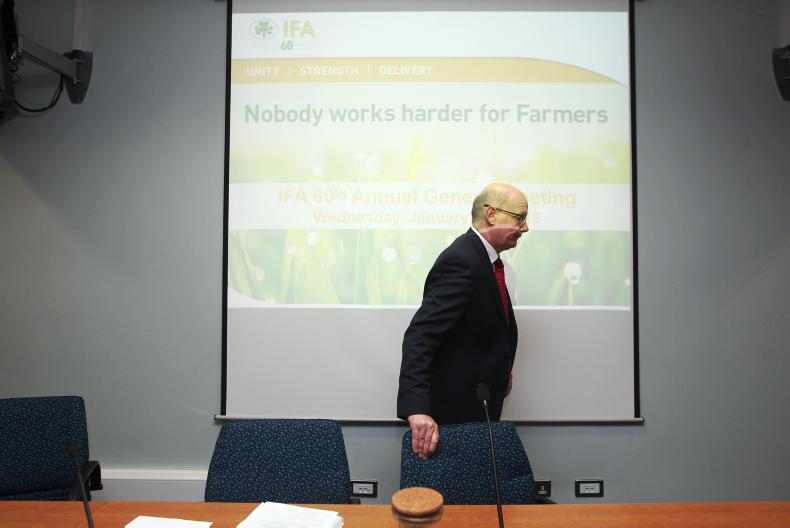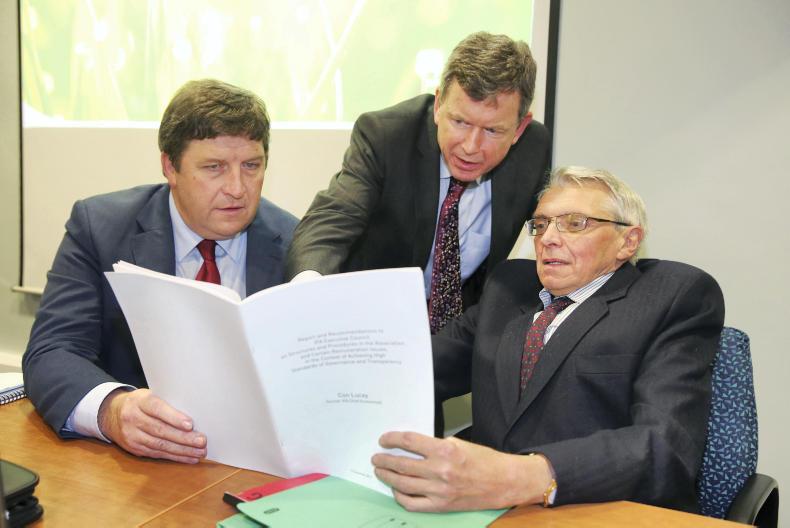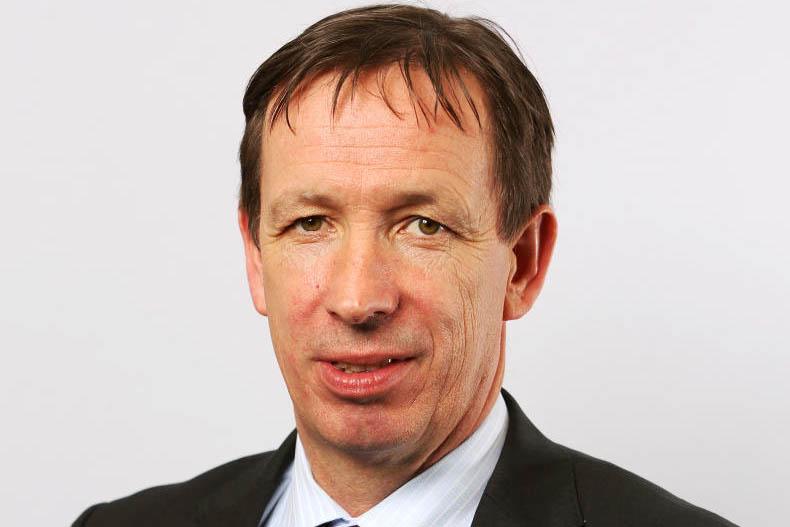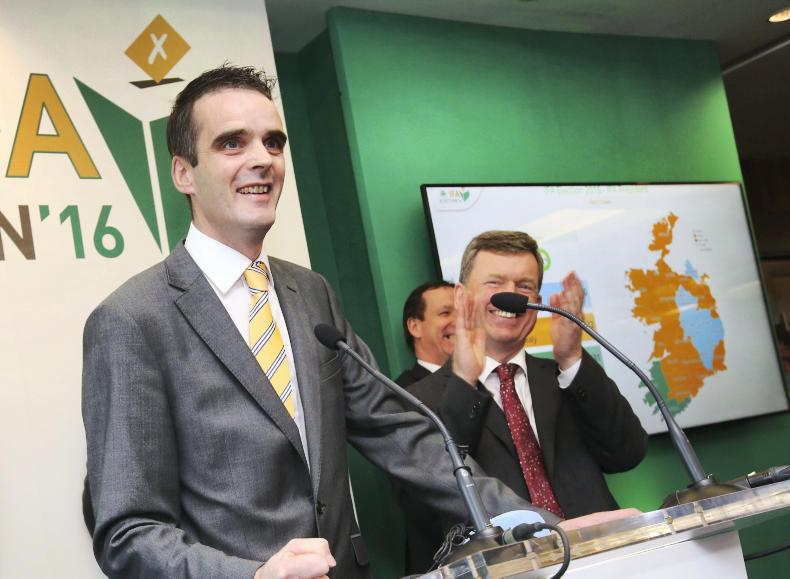This Friday 19 November will be one year to the day since Pat Smith departed as IFA general secretary. For the IFA – and for most of the key people in the organisation – nothing will ever be the same again.
As with most events, a few key people were embroiled in what unfolded. All could well cite the defence that “it was like that when I got here”. The problems that emerged – in terms of pay levels, oversight, and governance – had been building for years. They were being addressed: an external chair of the audit committee, recommended by Con Lucey when he departed in August 2014, had just been announced, and the remuneration committee was being augmented by former Glanbia CEO John Moloney. Yet, the pace of change was too slow for some.
Derek Deane, who led a no-confidence motion against Pat Smith the previous January, had been gaining increasing traction with his claims around Smith’s level of pay.
On Wednesday 18 November, Deane stated on the Drivetime radio programme that Smith was receiving a salary of €450,000. It was a game changer.

19 Nov 2015: Pat Smith departs
Smith had been general secretary of the organisation for over five years. Following discussions the next day with then-president Eddie Downey, Smith departed.
Smith said: “The IFA is bigger than any one person. I have decided to put the best interests of the association to the fore. It has been a great honour and privilege to work with the IFA for the past 25 years.” Downey paid a warm tribute to Smith.
Since then, he has set up a renewable energy company, Local Power.
Assistant general secretary Bryan Barry assumed Smith’s responsibilities for a full year, as the association worked through a review of its governance and structures.
Smith’s responsibilities are being split between two people. The titles of director general and secretaries will be used.
25 Nov: Eddie Downey resigns
As president, Downey supported Pat Smith strongly, right up to the day of Smith’s resignation. The following day, he chaired a meeting of IFA’s executive council.
There was no criticism of the decision to part with Pat Smith. The issue of compensation never came up. The meeting confirmed that Smith had indeed been earning the kind of money Deane alleged.
The word “remuneration” made its appearance – covering total salary, bonuses, and pension contributions. In Pat Smith’s case, it had amounted to €495,000 in 2014. This news dominated the headlines, as rank-and-file farmers expressed outrage over the pay levels.
On the Monday evening, it was announced that Downey was “stepping back”, while Con Lucey would carry out a review of the situation. It was revealed that Downey was being paid €147,000 per year.
On the Wednesday, the executive council met in Downey’s absence. A marathon meeting reached a critical point when it was revealed that Pat Smith and Eddie Downey had agreed a severance package of €2m.
Downey decided to resign. He later said he felt he had “been thrown under the bus” by other unnamed leading members, with whom he had at least consulted in making the agreement with Smith. Contradictorily, he also said he hoped that the IFA would not have to pay “another penny” to Smith.

26 Nov: Tim O’Leary takes over
Tim O’Leary, the deputy president, now became acting president.
The meeting ran until 5am, when, in a brief statement, O’Leary said the IFA would “fight all the way” against Pat Smith’s claims.
O’Leary must have been physically and emotionally shattered following the previous day’s events. Pressed on his own ambitions on radio on Thursday, he admitted he was interested in being a presidential candidate in the election now triggered.
Pat Smith then called for his severance package to be paid in full, pledging the €1m payment to charity, with the other €1m to be paid over 10 years. That night, appearing on RTÉ’s Primetime, O’Leary echoed a press statement, which stated that Pat Smith had been “effectively fired”. The warm words of one week earlier were a million miles away now. Legal action seemed inevitable.
Tim O’Leary, who for months had been seen as the front-runner to eventually succeed Downey, was damaged by his first day in office, and by the perception that all leading officers in the IFA had been too passive. In mid-December, Tim, while remaining as deputy president, stepped down as acting-president to pursue his candidacy. His chances of becoming president vanished in early January when, alongside Derek Deane, he fell one nomination short of the six required from county chairs. It was harsh, but perhaps for the best, as he would surely have been targeted for some rough treatment at the endless election hustings meetings around the country.

16 Dec: Jer Bergin steps in
IFA treasurer Jer Bergin effectively became interim leader following Tim O’Leary’s decision to step down. He had been defeated by Downey for the position in 2013, but now assumed it in circumstances no one could have foreseen or desired. He performed his task well, being sober and measured, ensuring the day-to-day work being carried out by both staff and farmer volunteers was not forgotten.
Bergin was treasurer and a member of the audit committee and the remuneration committee. He has never spoken of his role in those pivotal moments on 19 November. It is likely that it will only be revealed in court, if ever.
There is one deep irony in the midst of these events. The dispute over the validity of the agreement made between Downey and Smith centres on whether it had the approval required under the IFA’s rules.
The same body whose slow formation was at the heart of Con Lucey’s decision to resign from the audit committee, triggering much of what followed. The same body that could have examined the matter of pay levels internally had it been in place earlier.
Without their approval, the IFA believes the agreement is not binding. The other members of the remuneration committee were Tim O’Leary and Jer Bergin.

19 April Joe Healy sweeps to power
Meanwhile, Athenry farmer Joe Healy was watching these events unfold, as were all IFA members. He went along to the December Galway IFA executive to, as he saw it, ratify Michael Silke as an “outsider” candidate.
Silke decided not to go forward, and Healy headed home having been asked to allow his name go forward. The rest became almost inevitable, as – riding a tidal wave of grassroots distrust of all serving officers – he beat Henry Burns and Flor McCarthy to take over following a gruelling campaign in the spring.
Listen to a discussion of Damian McDonald's appointment in our podcast below:
Listen to "IFA appoints director general" on Spreaker.
Now, one year on from the loss of Pat Smith, Healy finally has a new CEO to spearhead the recovery of the organisation alongside him. Restoring the morale of a staff that has always been exceptionally close to the membership, who work “farmer hours” whether in Brussels, Buswells, or Belmullet is a key task for the pair. Ensuring the model of funding maintains necessary revenues is another.
Perhaps the third key action to be taken is to bring some closure to the events of November 2015, by resolving the litigation Pat Smith has brought in pursuit of his severance package and alleging defamation. Only then can the IFA say that it’s over.
For Pat Smith, Eddie Downey, and Tim O’Leary, the cost was high. Regional chairs James McCarthy and Tom Turley also failed to regain their positions.
Read more
Listen: Damian McDonald appointed new IFA boss
Salaries at the very top of the IFA cut sharply
Top IFA salaries revealed
Who is the IFA's new boss?
Lucey reforms cut IFA presidential pay packet by 20%
One year on, IFA closes the circle
Editorial: an important appointment for the IFA
This Friday 19 November will be one year to the day since Pat Smith departed as IFA general secretary. For the IFA – and for most of the key people in the organisation – nothing will ever be the same again.
As with most events, a few key people were embroiled in what unfolded. All could well cite the defence that “it was like that when I got here”. The problems that emerged – in terms of pay levels, oversight, and governance – had been building for years. They were being addressed: an external chair of the audit committee, recommended by Con Lucey when he departed in August 2014, had just been announced, and the remuneration committee was being augmented by former Glanbia CEO John Moloney. Yet, the pace of change was too slow for some.
Derek Deane, who led a no-confidence motion against Pat Smith the previous January, had been gaining increasing traction with his claims around Smith’s level of pay.
On Wednesday 18 November, Deane stated on the Drivetime radio programme that Smith was receiving a salary of €450,000. It was a game changer.

19 Nov 2015: Pat Smith departs
Smith had been general secretary of the organisation for over five years. Following discussions the next day with then-president Eddie Downey, Smith departed.
Smith said: “The IFA is bigger than any one person. I have decided to put the best interests of the association to the fore. It has been a great honour and privilege to work with the IFA for the past 25 years.” Downey paid a warm tribute to Smith.
Since then, he has set up a renewable energy company, Local Power.
Assistant general secretary Bryan Barry assumed Smith’s responsibilities for a full year, as the association worked through a review of its governance and structures.
Smith’s responsibilities are being split between two people. The titles of director general and secretaries will be used.
25 Nov: Eddie Downey resigns
As president, Downey supported Pat Smith strongly, right up to the day of Smith’s resignation. The following day, he chaired a meeting of IFA’s executive council.
There was no criticism of the decision to part with Pat Smith. The issue of compensation never came up. The meeting confirmed that Smith had indeed been earning the kind of money Deane alleged.
The word “remuneration” made its appearance – covering total salary, bonuses, and pension contributions. In Pat Smith’s case, it had amounted to €495,000 in 2014. This news dominated the headlines, as rank-and-file farmers expressed outrage over the pay levels.
On the Monday evening, it was announced that Downey was “stepping back”, while Con Lucey would carry out a review of the situation. It was revealed that Downey was being paid €147,000 per year.
On the Wednesday, the executive council met in Downey’s absence. A marathon meeting reached a critical point when it was revealed that Pat Smith and Eddie Downey had agreed a severance package of €2m.
Downey decided to resign. He later said he felt he had “been thrown under the bus” by other unnamed leading members, with whom he had at least consulted in making the agreement with Smith. Contradictorily, he also said he hoped that the IFA would not have to pay “another penny” to Smith.

26 Nov: Tim O’Leary takes over
Tim O’Leary, the deputy president, now became acting president.
The meeting ran until 5am, when, in a brief statement, O’Leary said the IFA would “fight all the way” against Pat Smith’s claims.
O’Leary must have been physically and emotionally shattered following the previous day’s events. Pressed on his own ambitions on radio on Thursday, he admitted he was interested in being a presidential candidate in the election now triggered.
Pat Smith then called for his severance package to be paid in full, pledging the €1m payment to charity, with the other €1m to be paid over 10 years. That night, appearing on RTÉ’s Primetime, O’Leary echoed a press statement, which stated that Pat Smith had been “effectively fired”. The warm words of one week earlier were a million miles away now. Legal action seemed inevitable.
Tim O’Leary, who for months had been seen as the front-runner to eventually succeed Downey, was damaged by his first day in office, and by the perception that all leading officers in the IFA had been too passive. In mid-December, Tim, while remaining as deputy president, stepped down as acting-president to pursue his candidacy. His chances of becoming president vanished in early January when, alongside Derek Deane, he fell one nomination short of the six required from county chairs. It was harsh, but perhaps for the best, as he would surely have been targeted for some rough treatment at the endless election hustings meetings around the country.

16 Dec: Jer Bergin steps in
IFA treasurer Jer Bergin effectively became interim leader following Tim O’Leary’s decision to step down. He had been defeated by Downey for the position in 2013, but now assumed it in circumstances no one could have foreseen or desired. He performed his task well, being sober and measured, ensuring the day-to-day work being carried out by both staff and farmer volunteers was not forgotten.
Bergin was treasurer and a member of the audit committee and the remuneration committee. He has never spoken of his role in those pivotal moments on 19 November. It is likely that it will only be revealed in court, if ever.
There is one deep irony in the midst of these events. The dispute over the validity of the agreement made between Downey and Smith centres on whether it had the approval required under the IFA’s rules.
The same body whose slow formation was at the heart of Con Lucey’s decision to resign from the audit committee, triggering much of what followed. The same body that could have examined the matter of pay levels internally had it been in place earlier.
Without their approval, the IFA believes the agreement is not binding. The other members of the remuneration committee were Tim O’Leary and Jer Bergin.

19 April Joe Healy sweeps to power
Meanwhile, Athenry farmer Joe Healy was watching these events unfold, as were all IFA members. He went along to the December Galway IFA executive to, as he saw it, ratify Michael Silke as an “outsider” candidate.
Silke decided not to go forward, and Healy headed home having been asked to allow his name go forward. The rest became almost inevitable, as – riding a tidal wave of grassroots distrust of all serving officers – he beat Henry Burns and Flor McCarthy to take over following a gruelling campaign in the spring.
Listen to a discussion of Damian McDonald's appointment in our podcast below:
Listen to "IFA appoints director general" on Spreaker.
Now, one year on from the loss of Pat Smith, Healy finally has a new CEO to spearhead the recovery of the organisation alongside him. Restoring the morale of a staff that has always been exceptionally close to the membership, who work “farmer hours” whether in Brussels, Buswells, or Belmullet is a key task for the pair. Ensuring the model of funding maintains necessary revenues is another.
Perhaps the third key action to be taken is to bring some closure to the events of November 2015, by resolving the litigation Pat Smith has brought in pursuit of his severance package and alleging defamation. Only then can the IFA say that it’s over.
For Pat Smith, Eddie Downey, and Tim O’Leary, the cost was high. Regional chairs James McCarthy and Tom Turley also failed to regain their positions.
Read more
Listen: Damian McDonald appointed new IFA boss
Salaries at the very top of the IFA cut sharply
Top IFA salaries revealed
Who is the IFA's new boss?
Lucey reforms cut IFA presidential pay packet by 20%
One year on, IFA closes the circle
Editorial: an important appointment for the IFA










 This is a subscriber-only article
This is a subscriber-only article














SHARING OPTIONS: